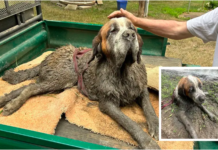Last Updated on July 2, 2021 by Fumipets
If you suspect that your dog is pooping with blood in his faeces, you are likely to be frightened, and for good reason! This may be caused by a broad variety of conditions in your dog, therefore it is important to identify the source of the problem. Allow us to assist you in determining the potential reason; if in doubt, speak with your veterinarian first.
Identifying whether or not there is blood present, as well as what sort of blood is present, might assist in narrowing down the list of probable reasons. First and foremost, be certain that it is blood and that your pet did not consume anything strange that included red colour before calling for help. If they’re moving anything through their digestive system that they ate, it might be anything from lipstick to a package of red hot tamales (note: do not let your dog eat hot tamales).
If you are still uncertain, try wiping a little amount of the product on a paper towel to get a better look. If you discover that it is blood, you will want to take note of the colour of the blood and contact your veterinarian as soon as possible.
When a dog gets blood in his stool, there are two sorts of typical concerns to look out for, each of which might indicate a different underlying reason.

Bright Red Blood in Stool
Hematochezia is a condition that occurs when your dog exhibits bright red blood in his faeces for an extended period of time. The appearance of a little amount of bright red may be nothing to be concerned about, and it may fade on its own. However, if you see excessive volumes of blood, it is imperative that you contact your veterinarian for a consultation. Don’t wait until the next morning.
When accompanied with other symptoms like lethargy and vomiting, bright red bloody diarrhoea might indicate that your dog is suffering from hemorrhagic gastroenteritis (HGE), a serious illness that may be deadly if not treated promptly. The possibility that puppies have received canine parvovirus, a viral illness that may be deadly, should be considered when they develop bloody diarrhoea in the first place.
The consistency of the stool, as well as the appearance of bright red blood, may both provide clues as to where the source of the issue is coming from. If your dog’s faeces has a regular consistency and is covered with a thin film of red blood on the outside, it is possible that the issue is originating from a low place in the digestive system. In other cases, symptoms such as diarrhoea and soft stools with red blood mixed in may indicate that the problem is located farther up the digestive system.
Potential causes of red blood in Dog stool
If your dog’s faeces includes blood that is brilliant red in colour, there are a few possible causes that may indicate that there is nothing to be concerned about with your dog’s faeces. Even if you only observe this once—and if the quantity of blood present in the faeces isn’t significant—you should be able to dismiss it or bring it up with your veterinarian at your dog’s next regularly scheduled checkup.
Haemorrhoids or other skin irritations
It is possible that a little amount of bright red blood on the exterior of the stool is caused by haemorrhoids or another irritation on the exterior of the anus. If your dog will let you, have a check around her body to see if there is anything that might have caused the condition that is visible on the outside.
Enlarged anal glands
Enlarged anal glands may sometimes result in a little quantity of bright red blood passing through your dog’s faeces. If you suspect this to be the case, you’ll need to have them examined by a groomer or a veterinarian to be certain.
Serious Illnesses
If your dog’s faeces is bright red and runny, this might be a more serious sign of illness. Bloody diarrhoea that is bright red in colour is a sign of a number of disorders that are regrettably not uncommon in canine patients. Many of these infections are serious, therefore your dog needs to be treated by a veterinarian as soon as possible after becoming unwell.
If your dog is still a puppy, you should take her to the veterinarian as soon as you discover even a tiny bit of red in her faeces. There is a possibility that she is infected with parvovirus. This is potentially lethal to pups and should be treated by a veterinarian as soon as possible.
Dark, Blackish Red & Tarry Stools
The presence of dark, blackish-red, and tarry stool indicates that the blood has either spent a significant amount of time in the digestive system or has been digested. Depending on where the problem is, it is either near or inside the stomach. Melene is the term used to describe this sort of blood seen in a dog’s faeces, and it may be difficult to detect for certain dog owners. If you see significant changes in your dog’s faeces, it is essential to consult with your veterinarian in case there is anything more severe going on.
Potential causes of black blood in Dog stool
The presence of black blood in your dog’s faeces indicates that it originated higher up in the digestive system, most likely around the stomach. This is often a symptom of a far more severe condition that should be addressed by your veterinarian as soon as possible.
Because some of these issues may be addressed if they are discovered early enough, do not put off bringing your dog to the veterinarian when you observe black or tarry stool in your dog.
Tumours in the digestive system
Tumours in the digestive tract of dogs might result in the development of black stool in them. This may also be a signal of cancer in dogs, so if your dog has black faeces, try to bear in mind that it might be a sign of something more serious. However, that is not the only option, so don’t get too worked up over it.
Ingested toxic substance
It is possible that dogs that have consumed a hazardous chemical will make black blood be present in their faeces. Please take your dog to the veterinarian as soon as possible if you believe this may have occurred to her and inform them of what you believe she may have eaten.
Kidney Failure
Dogs suffering from renal disease are more prone to passing dark blood in their faeces than other dogs. If your dog is suffering from renal failure, he may exhibit a wide range of symptoms and will be in really poor health. If this is something your dog is going through, you may already be aware of it since he may already be suffering from a disease that might lead to renal failure. Regardless, if you suspect this is the case, take him to the veterinarian right once.
Pancreatitis or Inflammatory Bowel Disease
Dogs suffering from pancreatitis or inflammatory bowel illness may have black stool in certain instances. Fortunately, both of these illnesses are very curable in dogs, and they may be treated throughout the length of your dog’s life if you follow your veterinarian’s recommendations. These illnesses may not necessarily have to be deadly for your dog, particularly if she receives prompt and frequent veterinary care, as recommended.

Addison’s disease
If your dog or puppy has caught parvovirus, you surely don’t want to risk infecting other dogs with this potentially fatal illness inadvertently. During the course of treating your dog, your veterinarian’s clinic will take steps to prevent the transmission of illness.
Vaccination against parvovirus is recommended for all dogs over the age of one year. As soon as your puppy is 6-8 weeks old, have him or her vaccinated against canine parvovirus, distemper, canine hepatitis, and rabies. If your puppy has a robust immune system, you should have him or her vaccinated as soon as possible. When they mingle and engage with other animals, these foundational immunizations will assist to keep them safe from infection and disease.
Make sure to keep an eye out for any other symptoms your dog may be experiencing at the same time. Your veterinarian may be able to diagnose the cause of your dog’s blood in his stool based on the symptoms you are experiencing. Always contact your veterinarian ahead of time rather than taking your pet directly to the veterinarian; but, if this is an emergency, please locate the closest animal urgent care or 24-hour emergency animal hospital to assist you.
Is blood in dog stool an emergency?
It is dependent on the situation. Because the probable reasons are so diverse, a recurrence of bloody faeces might be a small problem or it might be an indication of something that need immediate medical attention and treatment. That is why you should consult with a veterinarian as soon as possible. After discussing your dog’s symptoms with them and evaluating them, they will be able to advise you on the best course of action to take.
If you believe your dog’s illness is potentially life-threatening or requires immediate care, call your veterinarian or, if it is after hours, your local pet emergency facility so that they may be treated as soon as possible.
Can dog food cause bloody diarrhoea?
If the food your dog consumes causes stomach irritation, especially when transitioning from puppy to adult dog diet, this might result in bloody diarrhoea for your dog. That is why it is critical to introduce new foods in small increments. It may also be brought on by your dog consuming other hazardous human foods that he or she finds appealing. As soon as you suspect that your dog has eaten anything that has produced blood in his faeces, call your veterinarian immediately. This will allow them to identify and treat the issue more effectively.
Can a dog poop blood from stress?
Stress is a major cause of colitis in dogs, which may result in your dog passing blood in his faeces. Stress colitis may be produced by a variety of factors, including environmental changes (such as moving homes or boarding school) and anxiety-inducing circumstances (such as thunderstorms or explosions), among others. Stress colitis symptoms usually disappear after a few days, but you should still consult with a veterinarian to ensure that your dog is not suffering from anything else.

Potential Treatments for blood in dog stool
When dealing with blood in your dog’s stool, there are a range of remedies that you may likely utilize depending on the cause. To identify the best course of action, your pet must be examined by a veterinarian as soon as possible so that the veterinarian may establish the underlying cause of what is ailing your pet. One or more of the tests that a veterinarian may do to determine why your dog has blood in their stool include, but are not limited to, the following:
- Ultrasounds
- Endoscopies
- Blood work
- Faecal tests
- Urine tests
- X-rays
Seek help from experts early!
In certain situations, seeing blood in your dog’s faeces might be a frightening sight, and it’s true that seeing blood in your dog’s faeces is not a good sign. However, in many cases, the issue may be resolved quickly and easily by the veterinarian, or even by just waiting for the condition to resolve itself on its own. This does not always imply that your dog is terminally sick, but since it is always possible, seeking expert advice as soon as possible is critical to your dog’s health.
When your dog has blood in her stool, you should immediately consult with your veterinarian about the issue as soon as you see it. If you are attentive and attentive to any therapies that doctors suggest, your dog will most likely recover quickly and completely.


















